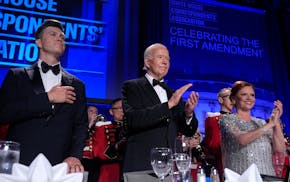Against the backdrop of a beleaguered stock market and looming possibilities of corporate bailouts, three candidates for the open seat in Minnesota's Third Congressional District seat squared off Tuesday over the economy, the solvency of Social Security and health care costs.
The debate, sponsored by TPT-Channel 2 and the AARP, served to solidify differences in the candidates' positions but left muddy the specifics about solutions in a race that is considered one of the most hotly contested in the nation.
Republican Erik Paulsen, a seven-term member of the state House and its former majority leader, faces DFLer Ashwin Madia, an attorney and Iraq war veteran, and Independence Party candidate David Dillon, a family business owner. Madia and Dillon are first-time office seekers.
None of the candidates supported a bailout of financial institutions, but they disagreed on the nuances of how much regulation is needed.
"Regulatory involvement is absolutely key," Paulsen said. "We should not be bailing out Wall Street."
All supported greater regulation of the home mortgage industry, but Madia said there should be no protection for those who engaged in speculation in the real estate market and lost.
Dillon said the crisis highlights the need for greater economic education for consumers.
Tackling the budget
On the federal budget deficit, Dillon has made, perhaps, the most dramatic proposal: He pledged to resign should he ever vote for continued deficit spending. Madia has cited spending in Iraq as a continued drain on the economy and says he will support "pay as you go" budget rules that require any increase in spending be offset by cuts somewhere else. "Line by line. Dime by dime," he said.
Madia also opposes such things as economic stimulus packages as short-term remedies that he said cause more problems in the long run.
Paulsen recently stood at the podium of the Republican National Convention and gently criticized his own party, as well as the Democrats, saying he will go to Washington to reacquaint both parties with the "principle of fiscal responsibility."
Paulsen has favored extending the tax cuts initiated by President Bush, saying they support small business. Madia supports continuing the cuts for most earners and small businesses, while cutting the breaks for people earning $250,000 or more a year, a plan embraced by Democratic presidential candidate Barack Obama.
About Social Security
Without calling for privatization, Paulsen urged "protecting and preserving" Social Security, but he also advocated programs that would use individual savings plans to supplement it. Madia opposes privatization and said Congress must stop raiding the trust fund to support other programs.
Dillon said the answer is simple but politically unappetizing to entrenched major parties. "The answer is you are going to have to put a little more money in or take a little less money out, or both. If it's the third rail of politics, bring it to me, I'd like to put my tongue on it," he said.
The candidates are seeking to succeed U.S. Rep. Jim Ramstad, a Republican who is retiring after nine terms. Ramstad has been able to straddle constituencies in a moderate western Hennepin County district that is the most affluent of Minnesota's eight congressional districts. Ramstad won 65 percent of the vote in his last election.
Although all three candidates claim to share Ramstad's ideological heritage, he has endorsed Paulsen, who once worked for him. While the district has long been solidly GOP, the Rothenberg Political Report lists the race as a "pure toss-up," one of 10 House races to get that designation. The Cook Political Report also rates the race a toss-up.
Mark Brunswick 651-222-1636
Utah GOP picks Trump-backed mayor as nominee to replace Sen. Mitt Romney, but primary foes await
A Hawaii military family avoids tap water at home. They're among those suing over 2021 jet fuel leak

Chants of 'shame on you' greet guests at White House correspondents' dinner shadowed by war in Gaza

